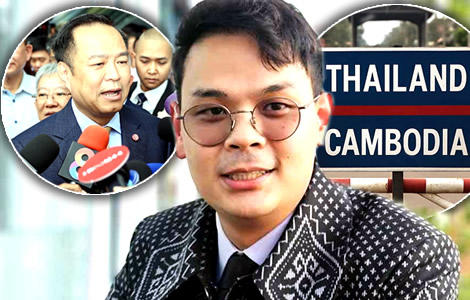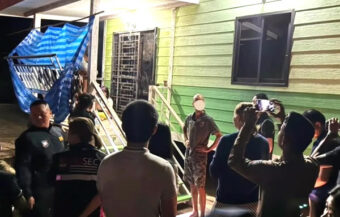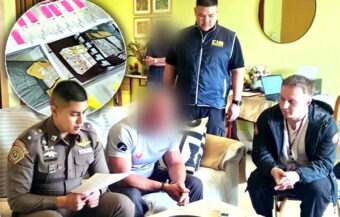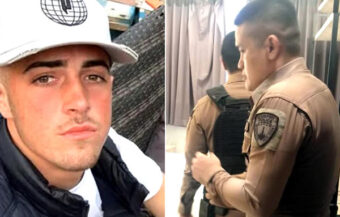Incoming minister Chaichanok Chidchob slams claims of reopening Thailand’s border with Cambodia, as military warns of risks, citing weapons withdrawal, mine clearance, and crackdown on scams as strict conditions before any crossing is allowed.
Incoming Digital Economy and Society Minister Chaichanok Chidchob has come out swinging, flatly denying claims that the incoming government plans to reopen Thailand’s border crossings with Cambodia. His remarks come amid growing pressure from a third country reportedly pushing Bangkok to soften its stance. Prime Minister Anutin Charnvirakul has also dismissed the reports, calling them misleading and premature. The military is on high alert, with senior commanders firmly rejecting any move to ease border restrictions, warning it could jeopardise national security. Meanwhile, signs suggest Phnom Penh is eager to normalise ties, but for now, Thailand’s powers that be are standing their ground.

Tensions have surfaced between Thailand’s incoming administration and the military over the country’s approach to Cambodia. Although Prime Minister Anutin Charnvirakul’s government has not yet assumed office, the issue has already ignited strong reactions.
Significantly, senior military leaders, including outgoing 2nd Army commander Lieutenant General Boonsin Padklang, have voiced firm opposition to any rapid thaw in relations with Phnom Penh. They argue that there should be no rapprochement until three strict conditions are met. First, Cambodia must withdraw its armed forces and heavy weapons from sensitive border areas. Second, it must cooperate in clearing landmines still buried along the frontier. Finally, and perhaps most urgently, it must take visible action against scam operations operating across the border.
Foreign pressure mounts on Bangkok as the military sets strict conditions for border reopening with Cambodia
Despite these clear red lines, reports suggest that a third country is putting pressure on Bangkok to ease restrictions. While unnamed, this foreign influence has raised eyebrows within Thailand’s political and military circles.
On Friday, acting Digital Economy and Society Minister Chaichanok Chidchob publicly rejected any suggestion that the Thai-Cambodian border should be reopened soon. Importantly, he pointed out that the current situation, governed under MOU 44, remains highly volatile. According to Chaichanok, it is not only inappropriate to open the border now—it would be dangerous.
Moreover, he insisted that Anutin, leader of the Bhumjaithai Party, has never supported such a policy. “This is a clear case of miscommunication,” Chaichanok said. “Mr. Anutin is deeply patriotic. He would not risk national security for political convenience.”
Notably, the Bhumjaithai Party has been active in four provinces impacted by the Thai-Cambodian conflict. They have worked with displaced residents, set up evacuation centres, and even supported families affected by suicides caused by displacement.
Bhumjaithai emphasises safety and stability as party rejects premature border reopening under MOU 44
For this reason, the party believes any premature border reopening could trigger more instability. Chaichanok emphasised that both the military and the local population are aligned in their rejection of the plan. “No matter how long the closure lasts, as long as it keeps people safe, they will endure,” he said.
Additionally, he raised concerns about ongoing discussions regarding MOU 44. This controversial memorandum has shaped Thai-Cambodian border policy for nearly two decades. It includes provisions related to marine resources and territorial access—issues that remain unresolved. “If this matter is about to be resolved, opening the border now risks chaos,” Chaichanok added.
Meanwhile, Prime Minister Anutin has categorically denied authorising any move to reopen any border checkpoints. He said any such decision must wait until his government is formally in place. “Let me be clear—I have not issued any policy,” Anutin said. “Until I receive royal endorsement and deliver my policy statement in Parliament, nothing changes.”
Anutin also questioned the origin of the reports. “I don’t know where this information is coming from,” he said. “But the Thai people must remain our priority.”
Leaders reaffirm policy decision as Cambodia’s sincerity and local voices remain key to border decisions
Adding to the political weight, Bhumjaithai deputy leader Siripong Angkasakulkiat reaffirmed that no instructions had been given regarding the checkpoints. He said that any decision to open or close border crossings must serve Thailand’s interests—not those of a third country.
Siripong highlighted another core issue: Cambodia’s sincerity. “Before any reopening, we must assess whether Cambodia will actually pull back its troops,” he said. Furthermore, he stressed the need to consult with locals living along the border. “We need their voices, not just strategic plans,” he insisted.
The military has also made its stance unmistakably clear. According to Army Region 2 and its spokesperson, Major General Winthai Suvari, reopening the checkpoint now could encourage gambling dens, human trafficking, and online scam centres. As a result, the Ministry of Foreign Affairs echoed this position, declaring that no borders would reopen until visible progress was made.
Nikorndej Balankura, the Ministry’s spokesperson, outlined the three preconditions once again: withdrawal of weapons, humanitarian mine clearance, and decisive action against cybercrime.
GBC meeting sets detailed plans for demining and joint operations against scams before any border reopening
Notably, both countries agreed on these points during a recent General Border Committee (GBC) meeting in Koh Kong. As a result, joint working groups have been established. The mine clearance team will draft operational plans within one week. Demining is expected to begin within one month.
Regarding scam centres, Thailand has already shared intelligence on more than 60 Cambodian locations. A follow-up coordination meeting is scheduled for September 16 in Sa Kaeo. Nevertheless, Nikorndej stressed that no checkpoint will open until these issues are resolved. “Reopening remains an idea, not a policy,” he said.
He also confirmed that Cambodia agreed to remove heavy weaponry from high-risk zones within a defined timeframe. Further discussions are ongoing between the Thai–Cambodian Joint Boundary Commission. The Regional Border Committee will oversee implementation.
To reduce tensions, both sides also agreed to tone down public rhetoric and combat the spread of misinformation. Meanwhile, selected border points may be considered for reopening—but only in low-risk areas and only if all conditions are met.
Japan’s concern on border easing clarified as Bangkok maintains firm stance amid Phnom Penh gestures
Separately, Japan’s call for border easing—voiced via its embassy in Bangkok—sparked online backlash. However, Nikorndej clarified that Japan’s concern stemmed from disruptions in the regional supply chain. He confirmed that Thailand is engaging with Japan to explain the delays.
2nd Army chief warns Acting PM Cambodian regime cannot be trusted and that border must stay closed
Despite Phnom Penh’s public gestures—Cambodian Prime Minister Hun Manet recently congratulated Anutin and offered friendship—Bangkok remains firm. Officials believe Cambodia’s intent to normalise ties is real, but premature. Until the eastern neighbour proves its commitment with action, Thailand’s military and political leadership are united in caution.
Thailand will host the next special GBC session within 30 days. Until then, the country’s border with Cambodia will remain closed.
Join the Thai News forum, follow Thai Examiner on Facebook here
Receive all our stories as they come out on Telegram here
Follow Thai Examiner here
Further reading:
2nd Army chief warns Acting PM Cambodian regime cannot be trusted and that border must stay closed
Charged situation – Defence chiefs from Thailand and Cambodia meet in Kuala Lumpur. ASEAN damaged
Fear on Eastern border under Martial law. Cambodian Bond nabbed on ฿162 a day from Phnom Penh regime
Cabinet meets after Cambodian ceasefire. Acting PM Phumtham spoke later with Trump for 30 minutes


















